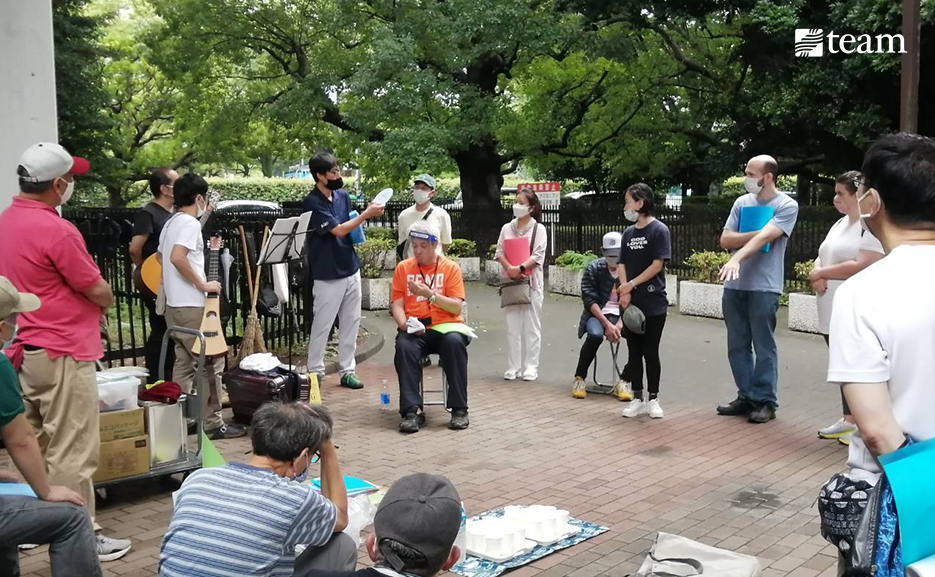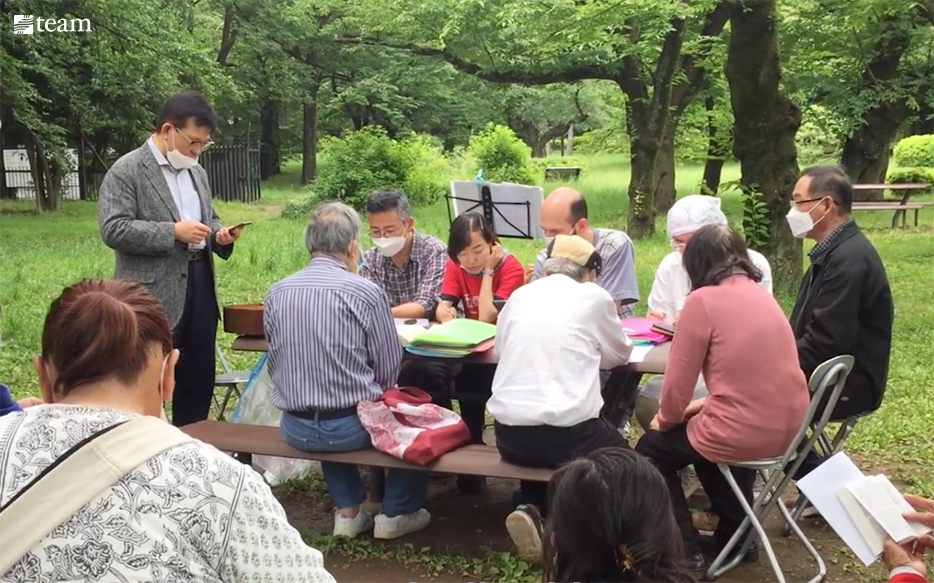
Ministry Updates
Japanese Park Ministries Offer a “Level Step” to the Gospel
October 13, 2022
by Suzanne Pearson

In Japanese, “shiki ga takai” (しきが高い ) refers to a “high step.” The phrase means that it’s difficult to enter somewhere – not literally, but figuratively. Shiki ga takai is something we’ve probably all experienced at one time or another. It’s that moment when you feel like an outsider. The situation is daunting, and it’s difficult to bring yourself to take that initial step.
For TEAM Japan’s David McClanahan and his co-laborers, years of cross-cultural ministry have shown that exploring Christianity can be a “high step” for the Japanese people. Many come from Buddhist, Shinto, or atheistic backgrounds, and regard Christianity with a polite detachment. To visit a Christian church would be shiki ga takai – a step that most Japanese people are unwilling or unmotivated to take.
A More Level Step
One place that provides a more level playing field, however, is Yoyogi Park in western Tokyo. “Yoyogi is like the ‘Central Park’ of Tokyo,” explains David. The 133-acre public park is noted for its wide lawns, picturesque ponds, and groves of ginkgo trees. Japanese people from all walks of life, from the homeless and disadvantaged to business professionals and families, frequent the park each day.
And for the past several years, Yoyogi Park has played host to a pair of ministries known as “Sidewalk Chapel” and “Mobile Church.” David explains that both ministries began several years ago, prior to TEAM’s involvement, and each has its own audience and purpose.
Come for the Food, Stay for the Relationship
Sidewalk Chapel is a gathering in the park each Saturday morning and Monday afternoon. The time consists of singing, a short message, and small group discussion. Sidewalk Chapel is designed as a touch point for those most in need. Free bread and rice are provided for those who attend, and folks are encouraged to stay and fellowship after the service.
“Sidewalk Chapel [seeks] to reach out to the disadvantaged in society,” David says. “So mostly [this is ministry] to the homeless, but also to people that are on the border [of homelessness] or have gotten out of homelessness.” David goes on to explain that often people come at first for the free food, but then return as relationships form, creating more opportunities for the Gospel.

As relationships form in the park, David and his fellow workers have more opportunities to share Christ.
Deeper Engagement
Mobile Church is another weekly gathering that allows for deeper spiritual engagement. “Because Sidewalk Chapel was more of an outreach, a few people thought it’d be nice to have something where they could have a deeper time. So they started Mobile Church,” David says.
Whereas Sidewalk Chapel draws crowds of up to 60 people, Mobile Church is a smaller group that consists of believers and those more serious about discussing biblical truth. Like Sidewalk Chapel, the time at Mobile Church includes singing, a message and discussion time, but also times for testimonies and prayer. David says the sharing times are very impactful. “People can hear about how God’s been working in their lives or what blessings or struggles they’ve had this last week,” he says.
After the service, people stay to enjoy lunch together in the park. Sinya Asai, an active member of Mobile Church, says he enjoys the fellowship that the weekly gathering provides. “We get to talk about the teachings with new people that participate,” he says. “After the event, we eat and talk with everyone. That’s how we enjoy ourselves freely.”
Location, Location, Location
Both park ministries serve as effective avenues to reach Japanese people because of the park’s visibility and accessibility. David notes that people are often curious when they hear praise songs being sung in Japanese, so they stop to listen. He shares a recent story of a man he met a few months ago.
“He just was walking by and someone said, ‘Hey, you want to join?’ And he did. And he’s been coming since,” David recalls. As David and his co-workers talked with the man, they learned that he had Christian ancestors, but no other connection to Christianity. However, even distant connections have meaning in Japanese culture, so the man’s interest was sparked, and he continues to engage with believers in the park.
David also shares that over the years, God has raised up leaders that began as attendees at Sidewalk Chapel. “One of the main people helping with Mobile Church stumbled on to a Sidewalk Chapel [12 years ago] and through that, got connected with a church nearby and now is helping with Mobile Church and some other ministries.”
In fact, David says, “A number of the main supporting staff are people that were homeless. They started coming to Sidewalk Chapel for food, and then became Christians and are now helping support the ministry.”
A Multicultural Effort
One particularly beautiful aspect of the park ministries is that they are truly a multicultural effort. The Mobile Church is led by a Korean pastor, and TEAM Japan workers as well as a number of Japanese churches help with both ministries. Japanese believers volunteer their time and resources to provide food as well as to help with various aspects of the weekly gatherings.
“The two ministries give people a lot of opportunities to serve,” David says. “People who maybe don’t have an opportunity at their local church to serve really get excited about being able to do music or lead small groups and interact with people.”
Sinya Asai says the diversity of Mobile Church is a blessing to him. “There are many people from different countries and different backgrounds,” he says. “I learn something new about different things.”
The park ministries also allow churches to work together toward a common goal. This collaboration is rare in Japan where individual congregations tend to stay siloed from one another. “There’s a feeling of power when you have all these little churches in Japan joined together, a power there that you don’t sense when you’re off on your own.”
Related articles


